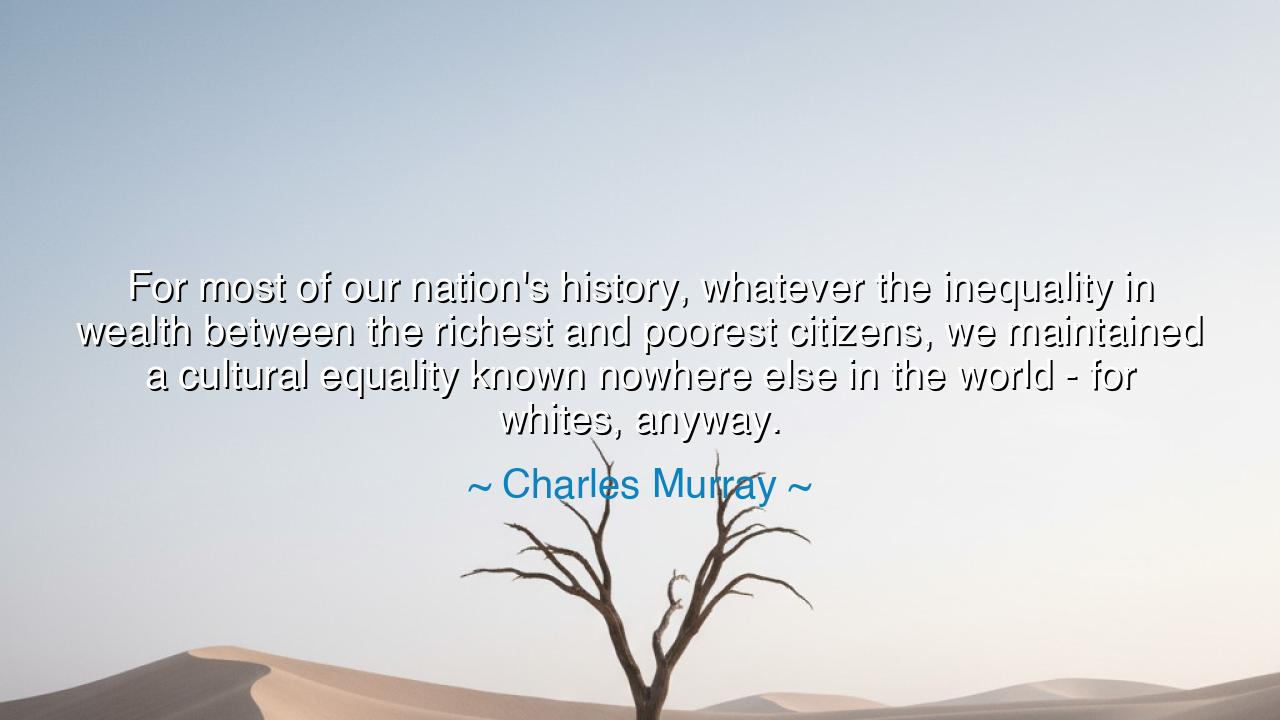
For most of our nation's history, whatever the inequality in
For most of our nation's history, whatever the inequality in wealth between the richest and poorest citizens, we maintained a cultural equality known nowhere else in the world - for whites, anyway.






Listen, O Children of the Future, to the words of Charles Murray, whose reflection on our nation’s history carries with it the weight of truth and introspection: "For most of our nation's history, whatever the inequality in wealth between the richest and poorest citizens, we maintained a cultural equality known nowhere else in the world - for whites, anyway." These words strike at the heart of our nation’s struggle with the dual forces of equality and inequality, a struggle that has defined us, challenged us, and ultimately shaped the world we live in.
In the ancient world, there were societies that claimed equality in theory but rarely practiced it in truth. Athens, the cradle of democracy, spoke of equality before the law, yet only the elite and male citizens had the privilege to participate fully in the society they shaped. Similarly, the mighty Roman Empire, whose strength lay in its diversity of peoples, was built on a foundation that excluded the rights of slaves, women, and those born outside of the Roman bloodline. The promises of equality rang hollow when certain groups were excluded from the table of justice. Murray’s words echo a similar irony in the history of our own nation: the cultural equality that was so strongly heralded was reserved for a specific group—white citizens—leaving others to fight for recognition and rights that were promised but not fulfilled.
Let us turn our gaze to the foundation of this nation—a place built upon the words “all men are created equal,” yet, for much of its history, only a select few were allowed to feel the weight of those words. The Founding Fathers spoke of freedom and equality, but their vision was limited by the narrow bounds of their time. The enslavement of Africans, the subjugation of Indigenous peoples, and the exclusion of women from political life all stand as glaring contradictions to the lofty ideals of the young American republic. The inequality in wealth between the richest and poorest was matched by an equally profound inequality in opportunity, with marginalized groups denied the very cultural equality that Murray speaks of. Wealth and opportunity were not distributed equally; rather, they were concentrated in the hands of the few, and society was shaped by the limitations placed on those deemed unworthy of participation.
Consider, too, the story of Jim Crow laws—a brutal and divisive period in the history of the United States. These laws, which enforced racial segregation, sought to maintain the cultural inequality that existed between white and Black citizens. While wealth inequality has always been a source of tension, cultural inequality is perhaps even more insidious. The cultural status of an individual shapes how they are seen in the world, how they are treated by their fellow citizens, and whether they are deemed worthy of the same rights and opportunities. The struggles for civil rights, spearheaded by Dr. Martin Luther King Jr., Rosa Parks, and countless others, were not only about dismantling legal and economic inequalities, but also about demanding cultural equality—the right to be seen and treated with dignity, regardless of race.
And yet, Murray’s words point to a deeper, more unsettling truth: equality was denied to non-white citizens even as the nation proclaimed itself a beacon of justice. The cultural unity that existed for white Americans was a fragile one, a unity built on exclusion rather than inclusion. The prosperity of the nation, the so-called American Dream, was offered as a possibility for all, yet for many, this dream remained out of reach. The battle for true equality, in all its forms—cultural, social, economic—was a long and painful one, and it is a battle that continues to this day.
The lesson, O Children, is one of reflection and action. Equality—whether cultural, social, or economic—is not a gift that is granted easily. It is something that must be fought for, and even when the laws are changed, the culture may still cling to old prejudices. It is not enough to merely wish for equality; we must strive for it actively, not just with laws, but with the changing of hearts and minds. True equality comes when all individuals, regardless of their background, are given the same respect, the same opportunities, and the same dignity.
In your own life, take action by acknowledging the inequalities that persist, not just in wealth, but in culture, opportunity, and respect. Seek to create a world where cultural equality is not a lofty ideal but a lived reality for all. Stand in solidarity with those who have been marginalized, and fight for a society where every individual, regardless of their race, gender, or status, is treated as equal in worth. In doing so, you will honor the lessons of the past and help to shape a future where the promise of equality is fulfilled for all, and where the voices of the marginalized are no longer silenced.






AAdministratorAdministrator
Welcome, honored guests. Please leave a comment, we will respond soon